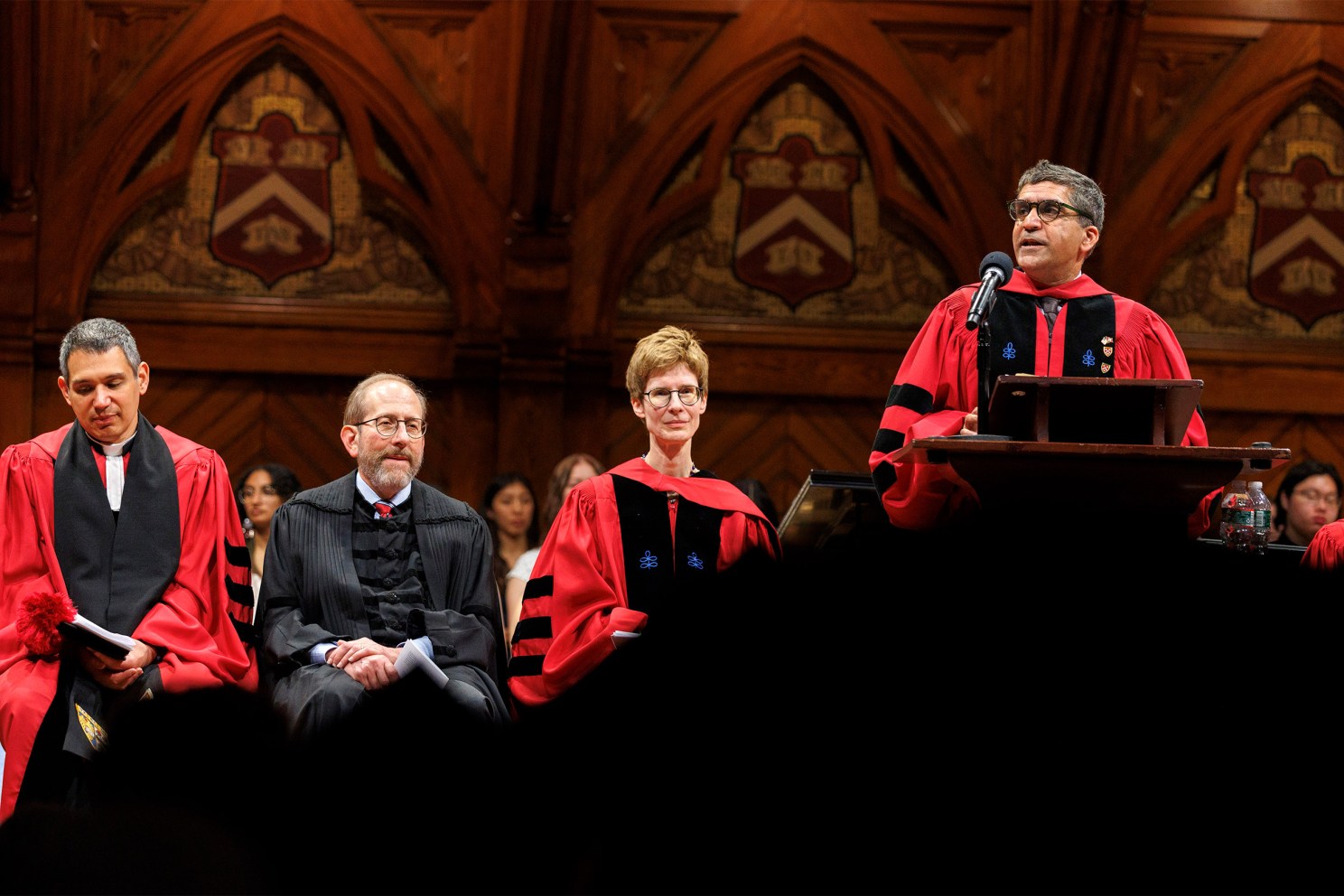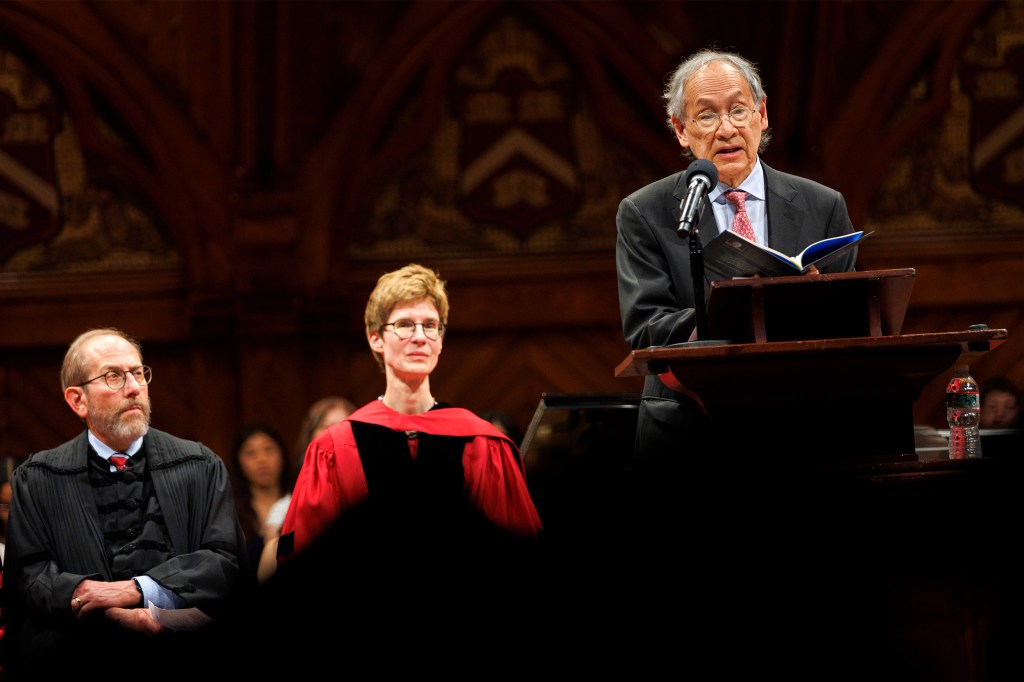Entering ‘our problem world’

Danoff Dean of Harvard College Rakesh Khurana (right) with the Rev. Matthew Ichihashi Potts (from left), President Alan Garber, and Karen Thornber, president of the University’s PBK chapter.
Photos by Stephanie Mitchell/Harvard Staff Photographer
University honors — and challenges — newly elected members of Phi Beta Kappa at ceremony
Part of the Commencement 2025 series
A collection of features and profiles covering Harvard University’s 374th Commencement.
Dozens of graduating scholars elected to the Phi Beta Kappa Society gathered in Sanders Theatre Tuesday morning.
They were called to order by Karen Thornber, president of the University’s chapter of the venerated honor society, the Harry Tuchman Levin Professor in Literature, and professor of East Asian languages and civilizations.
Thornber noted that students are elected, not merely for their near-spotless GPAs, but for their “depth and breadth” as scholars.
And she set a tone for the two-hour ceremony: commending the more than 200 elected students for this “tremendous honor,” then charging them with a responsibility to “continue your love of learning [and] inspire others to do the same.”
In prayer and oration, poetry and song, the event also acknowledged the troubled moment — notably, the University’s ongoing conflict with the Trump administration.
As he blessed the event, the Rev. Matthew Ichihashi Potts, Pusey Minister in the Memorial Church, invoked “a spirit of bravery.” And in a hymn with lyrics drawn from Langston Hughes, the Harvard University Choir enjoined graduates “to sit and learn about the world / Outside our world of here and now / Our problem world.”
Seated on the theater’s floor, the graduating members formed a cosmopolitan group: Over their gowns, many sported saris and hijabs, regalia from racial and ethnic affinity groups, and sashes marking home countries from Thailand to Brazil.
On stage were the officers of Harvard’s chapter and the three members of faculty who’d been awarded the chapter’s annual teaching prizes: Remo Airaldi in Theater, Dance & Media, Samantha Matherne in philosophy, and Steven Levitsky in government.
In keeping with traditions that stretch back to John Quincy Adams and Alfred Kazin, Henry Wadsworth Longfellow and Elizabeth Bishop, this year’s newly elected members heard from both a poet and an orator.
The poet was Arthur Sze — the son of Chinese immigrants who first dropped calculus for verse in a lecture hall at MIT over 50 years ago. Against his parents’ better judgment, Sze went on to Berkeley, a National Book Award for Poetry in 2019, and being honored as the first poet laureate of his adoptive hometown of Santa Fe, New Mexico.

In brief remarks, Sze called on the graduates to take risks and to attend to the interconnectedness — to neighbors and nature — at the heart of his own poetry. Of juxtaposition, Sze said, it “is more than mere artistic technique,” but “a vision of how to share our world.”
Reading his 2021 poem “Farolitos,” Sze sought to prepare his audience for the setbacks and wrong turns that are sure to mark their lives off-campus:
in this life, you may try, try
to light a match, fail,
fail again and again; yet, letting go, you strike
a tip one more time
when it bursts into flame —
Meanwhile, this year’s oration was delivered by Rakesh Khurana in one of his last acts as the longest-serving dean of Harvard College.
After 11 years leading the college, Khurana — who has dual appointments in sociology and at the Business School — warned that Harvard and other elite universities have a role to play in overcoming a “legitimacy crisis” now facing them.
“[Even] if we teach values of equity, selective institutions are seen as gatekeepers of privilege — hoarding opportunities rather than extending them,” Khurana said. And too often, he added, graduates of exclusive schools fail to use their capacities “in the best interests of the broader society.”
As he wrapped up an address once delivered by Ralph Waldo Emerson, Khurana contemplated the weightier meanings of the University’s motto: veritas.
In a time of deep division, where “confidence substitutes for understanding [and] complexity is flattened by outrage,” Khurana said that “truth — veritas — emerges slowly. It demands humility, skepticism, and the willingness to revise one’s views.”
Khurana cited his own work on efforts to foster “intellectual vitality” at the College as an effort to show veritas in action, as well as President Alan Garber’s resistance to federal demands. (Garber, who was seated onstage, drew a standing ovation at Khurana’s mention.)
As the event wound down, students and their families spilled into the transept of Memorial Hall to take photos and exchange greetings with classmates.
Nicolás Domínguez Carrero, one of the chapter’s four undergraduate marshals, found Khurana’s speech — and the ovation for Garber — “very moving.”
“I feel very proud to be a PBK scholar, and a Harvard student, at this moment,” he said, flanked by family from both Texas and Colombia. “I think Harvard’s doing an amazing job standing up for academic freedom and democracy, writ large. It is a time of crisis, but if there’s an institution that can weather this storm, it’s Harvard.”
Meanwhile, Levitsky, author of the bestsellers “How Democracies Die” and “Tyranny of the Minority,” was humbled by his teaching award.
But, he added, “The most wonderful thing about the ceremony was sitting on stage, watching the faces of the students. In this age of cynicism, I was blown away by how absorbed, how sincere they were… It really renewed my faith.”




